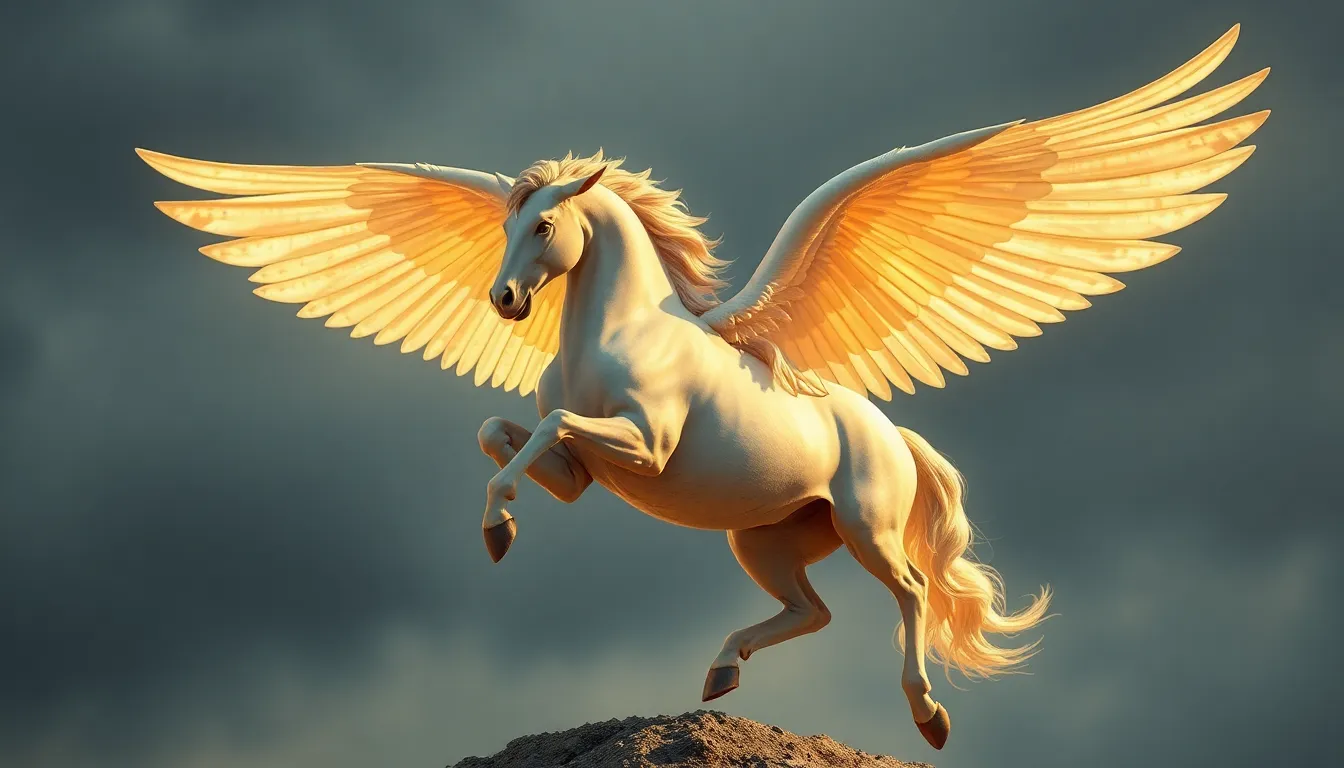The Influence of Pegasus on Modern Mythology and Storytelling
I. Introduction
In ancient Greek mythology, Pegasus is one of the most iconic figures, known as the winged horse that represents beauty and grace. Born from the blood of the Gorgon Medusa, Pegasus has inspired countless stories and artworks throughout history. This article aims to explore the significant impact Pegasus has had on contemporary storytelling, examining how this mythological creature continues to captivate the imagination in various forms of media.
II. The Origins of Pegasus in Greek Mythology
A. Mythological background and significance
Pegasus first appears in Greek mythology as a divine creature, often associated with the Muse of poetry, Calliope. He is not only a symbol of inspiration but also a representation of the connection between the earth and the heavens. His origins trace back to the myth of Perseus, who beheaded Medusa. From her blood sprang Pegasus, alongside Chrysaor, a warrior who wielded a golden sword.
B. Key stories and characters associated with Pegasus
Several myths feature Pegasus prominently, including:
- Perseus and Medusa: As mentioned, Pegasus was born from the blood of Medusa when she was slain by Perseus.
- Bellerophon: Pegasus became the steed of the hero Bellerophon, who rode him to defeat the Chimera, a fire-breathing monster.
- The Muses: Pegasus is often depicted as a companion to the Muses, symbolizing the creative process and inspiration.
III. Pegasus as a Symbol of Inspiration and Freedom
A. Interpretation of Pegasus in literature and art
Throughout history, Pegasus has been interpreted as a symbol of artistic inspiration and liberation. In literature, he often represents the ascent of the mind to new heights, encouraging creativity and the pursuit of knowledge. Artists have depicted Pegasus in various forms, capturing his ethereal beauty and strength.
B. The symbolism of flight and transcendence
The ability of Pegasus to soar through the skies embodies the human desire for freedom and transcendence. This symbolism resonates deeply in literature, where characters often seek to escape their earthly bounds or achieve a higher purpose, mirroring Pegasus’s own mythological journey.
IV. Pegasus in Modern Literature and Media
A. Representation in contemporary novels and poetry
In modern literature, Pegasus continues to be a potent symbol. Authors incorporate him into their works to evoke themes of aspiration and freedom. For example:
- The Last Unicorn by Peter S. Beagle: Pegasus is referenced as a symbol of the magical and the unattainable.
- The Lightning Thief by Rick Riordan: Pegasus appears in the context of Greek mythology interwoven with modern adventure.
B. Appearances in films, television, and video games
Pegasus has also found his way into various forms of media, including:
- Disney’s “Hercules”: In this animated film, Pegasus is depicted as a loyal companion to Hercules, showcasing friendship and bravery.
- Video games: Pegasus often appears in role-playing games, such as Final Fantasy and Assassin’s Creed, where players can summon or ride him.
V. The Evolution of Pegasus in Popular Culture
A. How interpretations of Pegasus have changed over time
As society evolves, so does the interpretation of Pegasus. In ancient times, he was revered as a noble creature. In contrast, contemporary portrayals often emphasize his role as a guide, mentor, or even a powerful weapon. This shift reflects broader changes in how we view mythological figures, often adapting them to fit modern narratives.
B. The blending of traditional mythology with modern narratives
Modern storytelling frequently blends traditional mythology with contemporary themes, creating rich narratives that resonate with today’s audience. Pegasus is a prime example of this blending, as he transforms from a simple mythological figure into a complex character embodying various human experiences and emotions.
VI. The Role of Pegasus in Fantasy and Science Fiction
A. Pegasus as a recurring motif in fantasy literature
In fantasy literature, Pegasus serves as a recurring motif, often symbolizing the extraordinary and the fantastical. Authors use Pegasus to enhance their worlds, depicting him as a majestic creature that enables heroes to embark on epic quests. Some notable examples include:
- The Wings of Fire series by Tui T. Sutherland: Pegasus-like creatures play a crucial role in the narrative, representing freedom and courage.
- The Pegasus Chronicles by Anna M. D. W.: This series reimagines Pegasus in a unique world filled with adventure and challenges.
B. Comparisons to other mythological creatures in speculative fiction
When comparing Pegasus with other mythological creatures, such as dragons or unicorns, distinct themes emerge. While dragons often symbolize power and destruction, and unicorns embody purity and grace, Pegasus uniquely represents the balance of strength and inspiration. This duality allows for rich character development and thematic exploration in speculative fiction.
VII. The Impact of Pegasus on Contemporary Storytelling Techniques
A. Narrative structures inspired by the figure of Pegasus
Pegasus has influenced narrative structures in contemporary storytelling. His ability to transcend boundaries and soar above challenges has inspired narratives that focus on personal growth and overcoming adversity. Writers often use his symbolism to develop arcs where characters break free from constraints, mirroring Pegasus’s own journey.
B. The use of Pegasus in character development and themes
Characters associated with Pegasus often embody traits such as bravery, creativity, and a longing for freedom. These traits allow for deeper character development and thematic exploration, as characters navigate their paths while seeking inspiration and liberation. This theme resonates across genres, from fantasy to romance, making Pegasus a versatile symbol in storytelling.
VIII. Conclusion
In conclusion, Pegasus’s influence on modern storytelling is profound and multifaceted. From his origins in ancient mythology to his representations in contemporary literature and media, Pegasus embodies themes of inspiration, freedom, and transcendence. As storytelling continues to evolve, the legacy of Pegasus will undoubtedly inspire future narratives, encouraging new generations to explore the depths of creativity and imagination through the lens of this magnificent creature.




